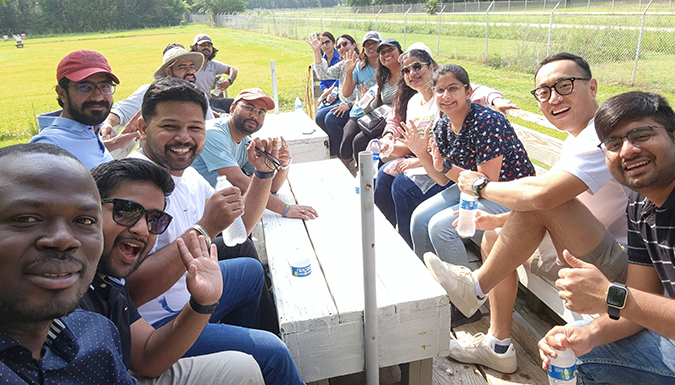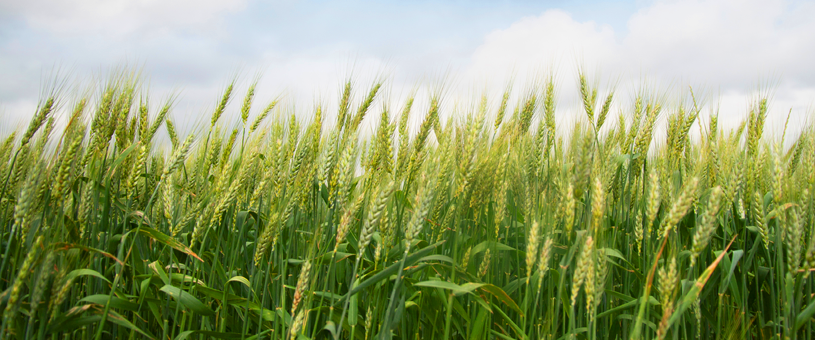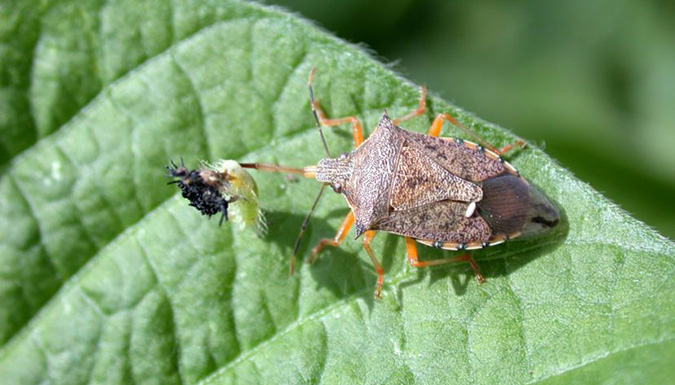Research Focus & Programming
-
Brassica/Leafy Greens
The vegetable breeding program at the Coastal Research and Education Center uses modern techniques to develop improved varieties for the Southeastern US that address key issues determined through active stakeholder engagement. These interactions have established the primary goals and key crops of the breeding program: developing new varieties of snap beans, leafy greens, cantaloupe and watermelon with enhanced resistance to diseases, heat and salinity stress. The long-term goals of the research program are to release improved cultivars that require fewer chemical inputs while increasing yield leading to increased sustainability and profitability of vegetable production in South Carolina.
Sandra Banham
Assistant Professor of Vegetable Breeding and GeneticsMatt Cutulle
Assistant Professor
Vegetable Weed ScienceBrian Ward
Assistant Professor
Organic Vegetable Specialist
Rice ProductionPat Wechter
Director, Coastal Research and Education Center
Research Lead -
Carolina Gold Rice (iCORP)
iCORP: Increasing Coastal Organic Rice Production
This interdisciplinary project combines research and extension conducted on organic-certified farms. The introduction of Oryza sativa ‘Carolina Gold,’ a long grain rice variety, into SC in 1685 was the foundation of the rice industry in the USA. During the 18th century, SC built an economy dependent upon agriculture and a unique landscape using ‘Carolina Gold’ rice. Rice production peaked from the 1780s to the 1860s. During this period, ‘Carolina Gold’ rice was produced throughout many tidewater growing areas, and yields were so high that the bottleneck in the industry became milling technology instead of production or harvest. Because of natural disasters (including hurricanes, flooding, rise in sea levels, and saltwater intrusion), social and political changes, rice cultivation almost came to a halt in SC. Although commercial rice production moved to the other southern US states, rice production is intrinsic to SC culture. Thus, developing salt-tolerant rice lines with desirable culinary qualities is critical to expanding organic production of rice. Current research focuses on greenhouse and field screenings of selected inherent salt tolerant varieties with low commercial and culinary qualities, commercial cultivated varieties, and new unreleased crosses for further selection of salt tolerance, weed suppression/weed competiveness and culinary purposes.
Matt Cutulle
Assistant Professor
Vegetable Weed ScienceBrian Ward
Assistant Professor
Organic Vegetable Specialist
Rice Production -
Eastern Broccoli Project
Both quality and yield trials are conducted in South Carolina. Temperatures warm rapidly in the spring, and summers are consistently hot. This region is one of the few in the eastern US with the potential to harvest broccoli in May, but early warm spells make production in that season a somewhat risky endeavor. Better adapted, heat-tolerant broccoli hybrids will make the spring harvest window a more attractive one for growers and allow an earlier start for fall crops.
-
Entomology
Insects occupy about 80% of everything in the animal kingdom, and there are far more species of insects than plants. Entomology research at Coastal REC develops practical, economical and sustainable approaches for managing pests and increasing beneficial insects and mites. Research focuses on applying knowledge of insect ecology to deter pests from food crops, enhancing pest predation and parasitism, improving insecticide use, and evaluating insecticide resistance.
Tom Bilbo
Assistant Professor
Vegetable & Strawberry Entomology
Department of Plant & Environmental SciencesBrian Ward
Assistant Professor
Organic Vegetable Specialist
Rice Production -
Green Beans
Sandra Banham
Assistant Professor of Vegetable Breeding and Genetics
-
Horticulture
As the oldest research station in South Carolina, Coastal Research and Education Center (CREC) began its rich history in 1932 as a Vegetable Truck Crop Research Station. The mission of this this station in breeding and management of vegetable crops that are more climate resilient regarding pests with disease resistance/tolerance is still the focus of the Horticulture program today. Today, we work closely with traditional and molecular geneticists, breeders, and stakeholders to optimize the vegetable industry for growers of all scale for both processing and fresh market. Horticultural research encompasses all vegetable research areas and expertise in genetics and breeding, bioinformatics, weed science, entomology, viral, bacterial and fungal pathology, nematology, postharvest handling. Collaborating with experts in these various field leads to finding solutions to agricultural issues faced by growers every day.
Brian Ward
Assistant Professor
Organic Vegetable Specialist
Rice Production -
Organic
Clemson Coastal Research and Education Center has been conducting NOP certified vegetable research since 2005. Current work in organic production is an extension of the Clemson University Coastal Research and Education Center Horticulture research program. Organic specialty crop research and production requires a thorough understanding of not only the underpinning sciences like genetics and pathology but of the production system holistically. This holistic approach starts with understanding soil dynamics and soil health, implementing covercrops, crop rotations, Integrated Pest Management (IPM), tolerant and resistant specialty vegetable crop germplasm utilization, and horticultural management strategies through genotype x environment x cultural practice interaction research that maximize production and economic returns to growers.
Brian Ward
Assistant Professor
Organic Vegetable Specialist
Rice Production -
Vegetable Pathology
The Vegetable Pathology laboratory centers around development of rootstocks suitable for grafted cucurbit production (watermelon, cantaloupe and cucumber), breeding for pathogen-resistant brassica leafy greens (turnip greens, mustard greens and collards), production of vegetables in controlled environment agriculture (CEA) and use of brackish and saline water in CEA vegetable production. Years of soil-borne pathogen build-up in our farmlands, in conjunction with the loss of several soil fumigants due to human health and environmental concerns have led to high disease pressure causing major yield losses in vegetable crop production. Our team uses the latest technologies such as molecular marker development, marker-assisted breeding, speed breeding, and high-throughput disease screening and trait phenotyping to quickly identify and incorporate pest resistance and superior quality (taste, texture, vigor, etc.) in the development of new cultivars suitable for South Carolina, the Southeast, and the international market. A major push by the U.S. Department of Agriculture for CEA has prompted our work to identify Brassica leafy greens and cucurbits that are adapted to growth in hydroponic systems and saline environments. Our Vegetable Pathology research is focused and committed to helping South Carolina be on the forefront of US vegetable production, as well as being a leader in the development of germplasm and systems for 21st-century agriculture.
Pat Wechter
Director, Coastal Research and Education Center
Research LeadTony Keinath
Professor of Plant Pathology
Research and Extension Vegetable Pathologist -
Watermelon
Watermelon is the largest acreage vegetable crop grown in South Carolina, which is the fifth-largest watermelon-producing state in the country. Part of the success of the state’s watermelon industry is due to the partnerships between growers and researchers at Coastal REC. Current watermelon research focuses on seedless transplant production, grafting and sustainable disease management. Approximately 80% of the watermelons produced in South Carolina are seedless.
Pat Wechter
Director, Coastal Research and Education Center
Research LeadTony Keinath
Professor of Plant Pathology
Research and Extension Vegetable Pathologist -
Weed Management
The mission of the CREC Vegetable Weed Lab is to test and develop efficient means of managing weeds through conventional and organic practices. CREC weed management research includes the evaluation of chemical and cultural weed management strategies, customization of emerging technologies such as robotics for weed control in vegetable production through collaboration with agricultural engineers and integrated pest management strategies emphasizing biological soil disinfestation.
Evaluation of chemical and cultural weed management strategies. Customization of emerging technologies such as robotics for weed control in vegetable production through collaboration with agricultural engineers. Integrated pest management strategies emphasizing biological soil disinfestation.
Matt Cutulle
Assistant Professor
Vegetable Weed ScienceBrian Ward
Assistant Professor
Organic Vegetable Specialist
Rice Production

PES-GSA visits Coastal REC
Clemson's Plant and Environmental Sciences Graduate Students Association
PES Graduate students from campus and other research stations visited Coastal REC (CREC) to learn more about the on-going research projects. CREC graduate students explained their dissertation projects on the REC tour and had in-depth discussions with other students.
Learn about Clemson's Graduate CoursesClimate Smart
Providing technical assistance and financial incentives to farmers to enable adoption of climate-smart practices.
SC Official Variety Trials
Crop Handbooks & Guides

SOUTH CAROLINA CROPS BLOG
Through the S.C. Crops Blog, Clemson agricultural scientists and Cooperative Extension Agents provide producers with the latest pest, weather, disease and variety trial information, and post news and updates from workshops and Field Days.
SC Crops BlogLAND-GRANT PRESS
Science-based, peer-reviewed publications written by Extension personnel and university scientists for professional and academic audiences, as well as owners and managers of livestock, horses, timber and land.
Visit Land-Grant Press
